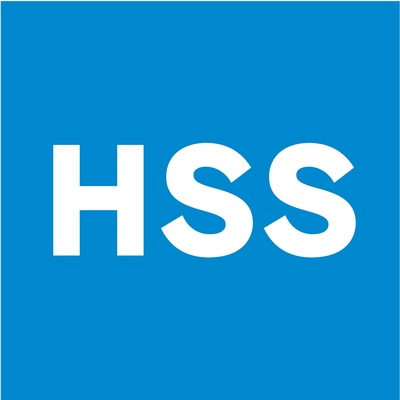Children with Arthritis Living in Less Affluent Families More Likely to Report Longer Duration of Morning Joint Stiffness
NEW YORK, Nov. 7, 2020 /PRNewswire/ -- Children with arthritis affecting five or more joints, called polyarticular juvenile idiopathic arthritis (polyarticular JIA), living in less affluent families were twice as likely to report more than an hour of morning joint stiffness, compared to their counterparts from more affluent families, according to a study by investigators at Hospital for Special Surgery (HSS). Parents and physicians should be aware that morning joint stiffness may indicate early disease symptoms of polyarticular JIA and serve as a more reliable indicator than pain.
Juvenile idiopathic arthritis (JIA) is a condition involving joint inflammation that lasts more than six weeks in children or adolescents under 16 years of age. It is the most common form of childhood arthritis, affecting about 1 in 1,000 children and teens in the United States. Scientists believe a combination of genetic predisposing factors and the environment causes JIA but the exact cause is unknown.
Polyarticular JIA is a chronic form of the disease with symptoms of pain, swelling, stiffness or warmth in four or more joints. Younger children may develop a limp or have difficulty using their fingers yet not complain about pain. Symptoms are typically worse first thing in the morning or after a period of rest and improve throughout the day as the child becomes more active.
"Polyarticular JIA looks a lot like rheumatoid arthritis in adults. Early diagnosis is essential to help keep the disease in remission, ensure children meet developmental milestones and delay or prevent joint destruction as they age," says Nayimisha Balmuri, MD, a third-year pediatric rheumatology fellow at HSS and lead author of the study. "Reported morning joint stiffness may be a better indicator of early disease symptoms than pain since reporting pain can be influenced by cultural factors. Our findings underscore the importance of early referral of suspected cases for expert diagnosis and treatment."
The study abstract is featured today in a poster presentation at ACR Convergence 2020, the American College of Rheumatology's annual conference, which is being held virtually this year.
Dr. Balmuri and colleagues, including senior author Karen Brandt Onel, MD, chief of pediatric rheumatology at HSS, identified 1,684 American patients diagnosed with polyarticular JIA using the Childhood Arthritis and Rheumatology Research Alliance (CARRA) Registry from July 2015 through February 2020. The CARRA Registry is a collection of information provided by North American patients and families on childhood-onset rheumatic diseases, including JIA.
The investigators extracted data on the presence and duration of morning joint stiffness. They also examined reported family income, the highest level of guardian-completed education and community poverty level, collectively called social determinants of health, using zip codes and the 2014–2018 American Community Survey. Finally, Dr. Balmuri and colleagues included the rheumatoid factor (RF) and anti-cyclic citrullinated peptide (anti-CCP) antibody status from patients' diagnostic lab results as indicators of disease severity. The patients were seven years of age, on average.
The researchers found that children with polyarticular JIA from less affluent families, defined as having an income of $25,000 to $49,000, were twice as likely to report more than an hour of morning joint stiffness compared to children with the condition from families with an income of more than $100,000. This association between reported morning joint stiffness held even after the researchers adjusted the data for age at diagnosis, and RF and CCP status.
"Family income as an indicator for insurance status may indicate that more affluent families can navigate the healthcare system better, ensuring their children see pediatricians sooner and therefore obtain earlier referrals to pediatric rheumatology sub-specialists," says Dr. Balmuri. "We can't prove that with our present study, but our findings raise important questions for further research."
"We hope our findings encourage physicians to ask patients about morning joint stiffness, not just pain, which may streamline the referral process," Dr. Balmuri says. "Time to referral affects how soon we can initiate multidisciplinary care, which may include medications, physical therapy and occupational therapy that are crucial for improving mobility and joint function over these children's lifetimes."
About HSS
HSS is the world's leading academic medical center focused on musculoskeletal health. At its core is Hospital for Special Surgery, nationally ranked No. 1 in orthopedics (for the 11th consecutive year), No. 4 in rheumatology by U.S. News & World Report (2020-2021), and named a leader in pediatric orthopedics by U.S. News & World Report "Best Children's Hospitals" list (2020-2021). Founded in 1863, the Hospital has the lowest complication and readmission rates in the nation for orthopedics, and among the lowest infection rates. HSS was the first in New York State to receive Magnet Recognition for Excellence in Nursing Service from the American Nurses Credentialing Center four consecutive times. The global standard total knee replacement was developed at HSS in 1969. An affiliate of Weill Cornell Medical College, HSS has a main campus in New York City and facilities in New Jersey, Connecticut and in the Long Island and Westchester County regions of New York State, as well as in Florida. In addition to patient care, HSS leads the field in research, innovation and education. The HSS Research Institute comprises 20 laboratories and 300 staff members focused on leading the advancement of musculoskeletal health through prevention of degeneration, tissue repair and tissue regeneration. The HSS Global Innovation Institute was formed in 2016 to realize the potential of new drugs, therapeutics and devices. The HSS Education Institute is a trusted leader in advancing musculoskeletal knowledge and research for physicians, nurses, allied health professionals, academic trainees, and consumers in more than 130 countries. Through HSS Global Ventures, the institution is collaborating with medical centers and other organizations to advance the quality and value of musculoskeletal care and to make world-class HSS care more widely accessible nationally and internationally. www.hss.edu.
View original content to download multimedia:http://www.prnewswire.com/news-releases/children-with-arthritis-living-in-less-affluent-families-more-likely-to-report-longer-duration-of-morning-joint-stiffness-301168105.html
SOURCE Hospital for Special Surgery

